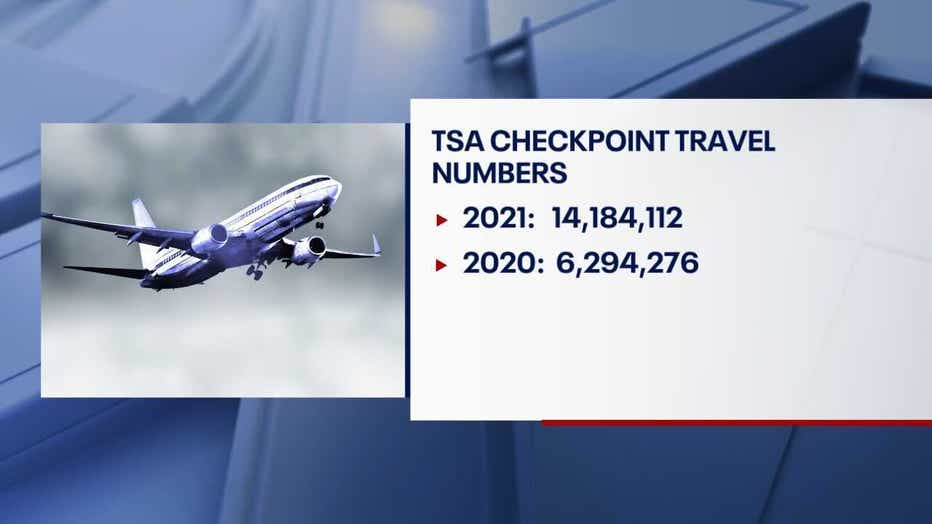Arizona health experts concerned for holiday COVID-19 surge as travelers arrive back from vacations
PHOENIX - It was another busy day of travel on Sunday, Nov. 28 as people are now returning home from Thanksgiving vacations, but health experts say this will have an impact on Arizona's already growing COVID-19 cases.
Sunday morning, Sky Harbor International Airport was packed with travelers, but by nighttime, things calmed down.
Since Nov. 21, more than 14 million passengers passed through TSA checkpoints in the U.S. – that’s more than double compared to 2020.
Health experts warn Arizona COVID-19 cases could increase, and of course, they’re keeping a close eye on the new variant, omicron.

Travel restrictions to take effect
The U.S. will restrict travel for non-U.S. citizens from South Africa and seven other countries starting Nov. 29.
The U.K. government is also tightening restrictions once again as face coverings will be mandatory in shops and public transportation. Travelers returning to the U.K. will require PCR testing and proof of a negative COVID-19 test.
Over in Israel, they’ve decided to completely shut their borders to tourists.
Coronavirus in Arizona: Latest case numbers
More restrictions are expected up north. It’s been just 20 days since the Canadian border reopened to the U.S. and some travelers say they're expecting changes, again.
Derek Wicks is traveling to Alberta, Canada from Phoenix.
"Seeing that it’s already spread – Belgium, Germany, Hong Kong – it’s a great idea to take precautions, for sure," he said.
Ghalid Ahmed is headed to the same destination and says, "If it happens, it happens. So after all the issues, after almost two years of this, I think you just take it in stride and if there’s a fifth wave or sixth wave. or whatever, then so be it. We just take it in our stride."
Charles Kaplan was traveling to New York from Phoenix. He says, "We are all vaccinated and boosted, as was our family here."
Adding, "We will see really how bad it is. They’re saying be cautious, masks, distance. Maybe they’ll make new vaccines, but I think it’s a little too … I mean it can change in weeks, right? But it’s a little too soon to change what we had to do this week."
The World Health Organization on Sunday urged countries around the world not to impose flight bans on southern African nations due to concerns over the new omicron variant.
WHO's regional director for Africa, Matshidiso Moeti, called on countries to follow science and international health regulations in order to avoid using travel restrictions.
"Travel restrictions may play a role in slightly reducing the spread of COVID-19 but place a heavy burden on lives and livelihoods," Moeti said in a statement. "If restrictions are implemented, they should not be unnecessarily invasive or intrusive, and should be scientifically based, according to the International Health Regulations, which is a legally binding instrument of international law recognized by over 190 nations."
What's being done now?
A number of pharmaceutical firms, including AstraZeneca, Moderna, and Pfizer, said they have plans in place to adapt their vaccines in light of the new variant. Pfizer says it expects to be able to tweak its vaccine in around 100 days.
Hand sanitizing stations remain set up around Sky Harbor airport. There are also vending machines that sell protective gear, COVID-19 testing sites and free masks available.
Tip: Check to see if there are any travel restrictions or tests required wherever your traveling to.
Related Stories:
- As new COVID-19 variant sparks global fear, Arizona health expert weighs in
- Moderna testing 3 COVID-19 booster vaccines on omicron variant, Pfizer ready to adapt
- WHO disagrees with flight bans over omicron variant
- How to sign up and schedule a COVID-19 vaccine appointment

